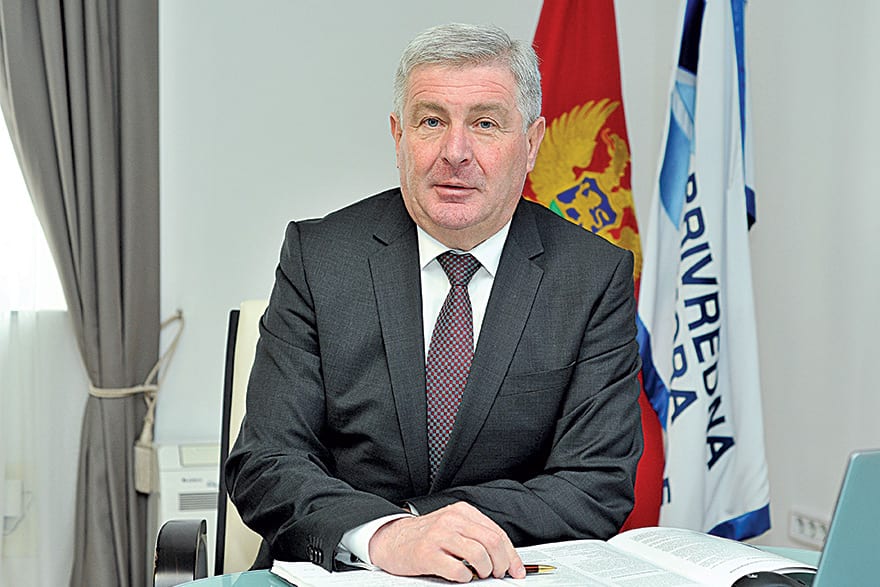Montenegro’s potential for economic growth lies in tourism, energy, agriculture and industry. As such, the focus should be on increasing economic competitiveness, along with the implementation of structural reforms and infrastructure development, in order to create conditions for the greater inflow of domestic and foreign investments
The World Bank’s Ease of Doing Business Index, along with reports of a number of other international institutions, certainly represent a useful indicator and a signal that gives us a clear picture of the situation in certain areas, and the segments that we need to improve further – which in this case is the business environment, says Vlastimir Golubović, President of the Chamber of the Economy of Montenegro.
However, there are many factors (methodology, coverage, data collection), which impact on the quality of every piece of research and which, no matter how perfect they are, cannot reflect the overall reality, says our interlocutor.
According to the recent Doing Business 2019 Report, Montenegro is ranked 50th among 190 countries, representing a fall of eight places compared to the previous year. The countries of the region that have a better ranking include FYR Macedonia (10), Kosovo (44) and Serbia (48), while Albania (63) and Bosnia and Herzegovina (89) have much lower rankings. According to representatives of the World Bank, these results don’t imply that Montenegro has regressed as a country, but rather that certain economies have achieved much faster progress in this segment. Nevertheless, this report has drawn the attention of decision-makers and business community representatives to the fact that there is still a lot of space for the improvement of the business environment, especially in terms of obtaining electricity connections, starting a business, registering property, obtaining construction permits and paying taxes.
In your opinion, what are the biggest challenges in the activities of domestic companies?
– The determination of Montenegro to join the European Union is the reason for a serious re-examination of market conditions and opportunities, primarily for the analysis of the business environment, business barriers and other obstacles that have a negative impact on the development of domestic companies.
The most important prerequisites for the growth and sustainable development of domestic enterprises include an adequate regulatory framework, access to finances, reduction of the grey economy and harmonisation of the education system with the needs of the labour market.
Montenegro is recording progress when it comes to improving the legal and regulatory framework. However, there are still challenges, and it is necessary to work continuously to overcome them. Here I’m primarily referring to the significant labour cost burden for employers, the informal economy, illiquidity, the inability to collect receivables and insufficient labour market flexibility. Moreover, numerous high taxes and fees at the local level create obstacles to business operations.
What is your overall assessment of macroeconomic trends and conditions for the rise of economic growth?
– During 2017, Montenegro’s GDP amounted to 4,299 million euros, with a real growth rate of 4.7%. The economy, strengthened by the implementation of large investment projects, continued to grow even in 2018, at a rate of 4.7% in the first two quarters, which is significantly higher than the real GDP growth in the European Union, which amounted to 2.2%.
Tourism, the retail sector and the construction industry were the main drivers of GDP growth this year, complemented by the manufacturing industry and electricity production, which have doubled the following investments in new capacities. Growth has stimulated job creation in the private sector and labour market recovery.
 Montenegro is facing a very high foreign trade deficit. The high import dependence of the Montenegrin economy is the result of a small production base and a high correlation between goods imports and tourism. Investments in infrastructure and the construction of new tourist capacities represent a significant generator of import, while the share of imported raw materials in the exported goods impacts on the foreign trade deficit. This year has seen an increase in revenue in the services sector, primarily in tourism, reflected in a slight reduction of the foreign-trade deficit on the current account.
Montenegro is facing a very high foreign trade deficit. The high import dependence of the Montenegrin economy is the result of a small production base and a high correlation between goods imports and tourism. Investments in infrastructure and the construction of new tourist capacities represent a significant generator of import, while the share of imported raw materials in the exported goods impacts on the foreign trade deficit. This year has seen an increase in revenue in the services sector, primarily in tourism, reflected in a slight reduction of the foreign-trade deficit on the current account.
The economic growth model, based mostly on FDI, will not be changed in the period ahead. Therefore, the focus will be on increasing economic competitiveness, along with the implementation of structural reforms and infrastructure development.
The Chamber, as an association that brings together and represents the interests of the creators of new values and social wealth in Montenegro, has a distinctive role in the EU accession process
To what extent have domestic companies been engaged in the economic activity created through major infrastructure works?
– Intensifying works on the implementation of large infrastructure, tourism and energy projects significantly impact on overall economic activity.
Certainly, the realisation of investment projects has had the greatest impact on domestic construction companies. Engaging local construction operators, equipment, manpower and materials, as well as employing the local labour force in related sectors (trade, warehousing, transport services etc.) during the construction phase, have a multiplier effect on overall economic growth.
The participation of local construction companies in project implementation and the share of experience and knowledge by foreign companies also have a positive impact on the adoption of EU standards lead to an improvement in the level of construction and technical supervision.
In the medium term, capital investments may have an adverse impact on fiscal indicators, but they contribute over the long term to more efficient valuations of domestic resources, and ultimately an increase in living standards.
Given the overwhelming dominance of foreign owners in the tourism industry, are there opportunities for domestic bidders and, if so, where?
– The emphasis in the tourism sector has been placed on high-quality tourism, diversification of supply and season extension, which will ultimately result in increased revenues, i.e. total added value in tourism.
The indirect effects of tourism development in Montenegro, reflected in the impact on the development of other economic activities, are also significant. Tourism also impacts positively on developments in the field of agriculture.
As a result of increased demand, growth in food and beverage production was recorded, even though this production still isn’t at a satisfactory level.
In addition to increasing the representation of local products in hotels and restaurants, there is the potential to develop rural tourism, whereby rural households, ethno-villages and summer pasture residences (katuns) should be among Montenegro’s brands. Incorporating traditional values into a modern tourist offer, which contributes to Montenegro being recognised as a country with its own specific offer, represents an activity to which special attention has been paid.
The Chamber contributes to the branding of local products and services of above-average quality, by granting them the right to use the collective trademark
Through the project “Good from Montenegro”, the Chamber of the Economy of Montenegro contributes to the branding of above-average quality local products and services, by granting them the right to use the collective trademark.
Through the project “Let’s Buy Domestic”, local products are specially labelled in retail chains, thus becoming more visible to consumers. Considering that the successful placement of domestic, high-quality products contributes to the enrichment of the tourist offer and its recognition, the project “Homemade flavours” has been launched.
What is your opinion of Montenegro’s progress in European integration, as well as the opening up of opportunities for membership through a shorter procedure?
– Montenegro has made significant progress on the European path, thereby giving proper validity to all efforts that have been continuously invested, not only on prescribing but also on the practical application of European standards on which the quality of life and the work of the largest integrated economic area in the world are based.
 The Chamber of the Economy of Montenegro, as an association that brings together and represents the interests of the creators of new values and social wealth in Montenegro, has a distinctive role in the EU accession process. The Chamber has been continuously conducting activities aimed at improving the business environment, raising the level of business skills through education, communication, promotion and other forms of support to businesses. The type, volume and dynamic of our activities keep pace with the overall activities of the state in integration processes. Representatives of the Chamber participate in 26 negotiating chapters.
The Chamber of the Economy of Montenegro, as an association that brings together and represents the interests of the creators of new values and social wealth in Montenegro, has a distinctive role in the EU accession process. The Chamber has been continuously conducting activities aimed at improving the business environment, raising the level of business skills through education, communication, promotion and other forms of support to businesses. The type, volume and dynamic of our activities keep pace with the overall activities of the state in integration processes. Representatives of the Chamber participate in 26 negotiating chapters.
The negotiation process is extremely challenging, especially given the fact that there are no universal solutions and that each new enlargement imposes more complex demands on future members. It is important that Montenegro continues fulfilling its European obligations and intensifying activities on the implementation of initiated comprehensive reforms, thus demonstrating that it has the capacity to complete a regulatory framework and implement it in practice.
The success, speed and dynamics of negotiations will depend on the consensus of all participants in this process. The fact that Montenegro has an increasing number of companies engaged in different manufacturing and service activities, doing business successfully on the most developed markets, confirms their indisputable international quality, as well as the contribution of the activities conducted by the Chamber of the Economy of Montenegro.
| OPPORTUNITY
The determination of Montenegro to join the EU is the reason for a serious re-examination of market conditions and opportunities that impact on the development of domestic business |
GAMECHANGER
Intensifying works on the implementation of large infrastructure, tourism and energy projects significantly influence overall economic activity |
CONTRIBUTION
The fact that Montenegrin companies are operating on the most developed markets confirms their quality, as well as the contribution of the Chamber’s activities |
|---|